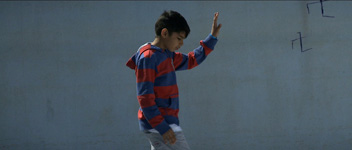Toto and His Sisters
Toto si surorile lui ROMANIA / 2014 / Romanian / Color / DCP / 93 min
ROMANIA / 2014 / Romanian / Color / DCP / 93 min
Director, Script, Photography: Alexander Nanau
Editing: Mircea Olteanu, George Cragg, Alexander Nanau
Sound: Matthias Lempert
Executive Producer: Bianca Oana
Producers: Valeriu Nicolae, Cătălin Mitulescu, Alexander Nanau, Marcian Lazăr
Production Company: Strada Film
World Sales: Autlook Filmsales GmbH www.autlookfilms.com
For Toto, a ten-year-old boy in Romania, surviving each day is a virtual miracle; his father is absent and his mother is in jail. When his seventeen-year-old sister is arrested on drug charges, the safety of his home is transformed into a hangout for underage hooligans. Under difficult circumstances where keeping one’s peace of mind is not easy, Toto takes steps to open doors to the future together with his fifteen-year-old sister Andreea. This film looks deeply into the unblemished souls of children as it presents the bitter reality of young boys and girls around the world whose fate is controlled by infantile adults.
[Director’s Statement] The question of what makes us who we are, and how we choose our models as children, is a central issue for me in this film. After nine months of research, I decided to tell the story of Toto and his sisters, a story that deals with the difficulty of children of different ages growing up without their mother in an environment dominated by poverty, violence and drug abuse, yet finding the strength to see the richness of life beyond that.
Their story is a metaphor that can be applied to many children whose destinies seem to have been already determined at some point in their lives. The fact that some are born in the circumstances of our protagonists is, from my perspective, an accident of fate and has nothing to say about the abilities and the aspirations that one has. More crucial for the development of one’s perspectives and imagination are the models chosen and the kind of life they pursue.
It is important that the film remains accessible to the viewer without trying to shock or to emphasize the misery of the ghetto. The violence and drug abuse should be perceived just as the protagonists live and see these things: as a normal part of life. The camera that shoots mostly at the characters’ height supports this concept. Thus, the film’s attitude is not of looking down to the children, as if they were “small and vulnerable.” We will always look through their eyes, at their own height, from a position of equality. To me the observational documentary is the most interesting form of telling this story, because I can become invisible as a storyteller and the viewer can interact directly with the characters.
An important element sustaining the story’s intimacy is the video material that Andreea herself shot, documenting their life. It is a film made with them, not only about them.
 Alexander Nanau
Alexander NanauGerman film director born in Romania, he studied directing at the Film and Television Academy Berlin (DFFB). His documentary film, The World According to Ion B. (2010) was awarded an International Emmy Award for Arts Programming in 2010. The film traveled to over fifty festivals worldwide. Nanau’s first feature documentary, Peter Zadek inszeniert Peer Gynt (2006) was released in cinemas across Germany and Austria in 2006.
